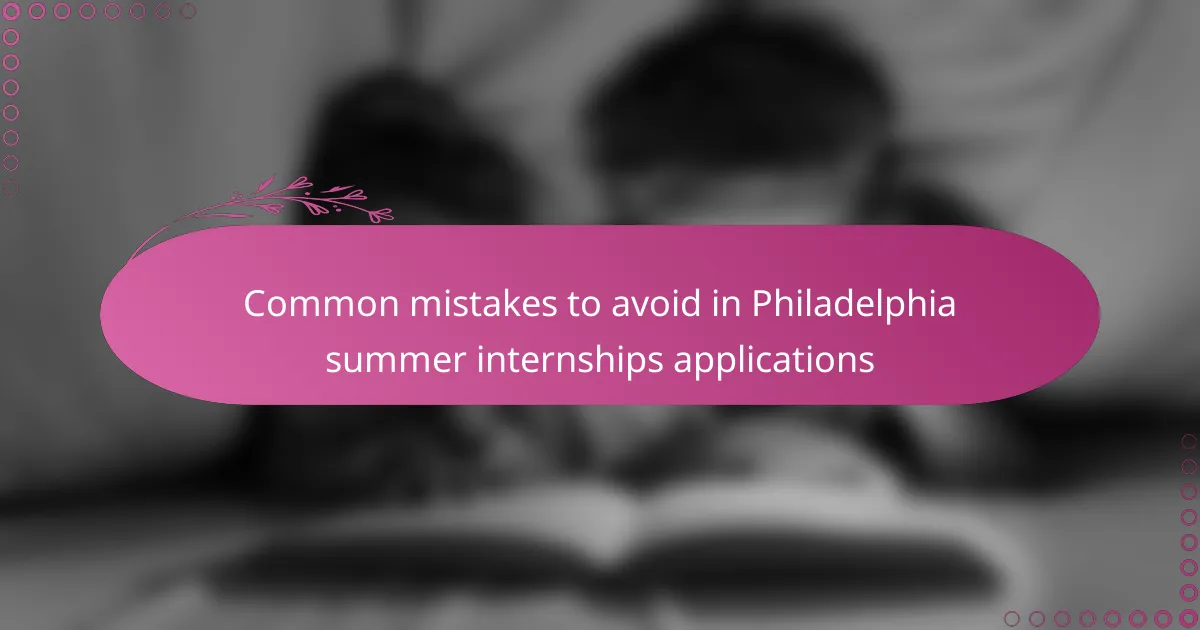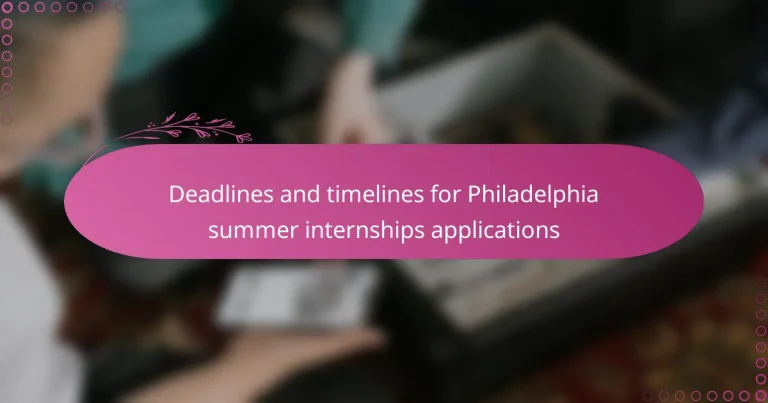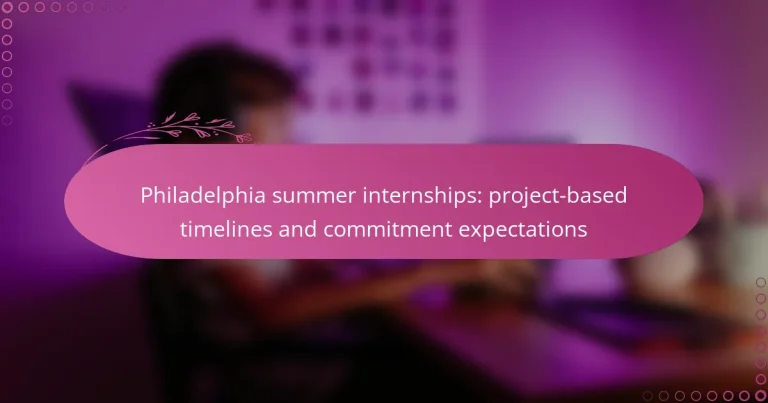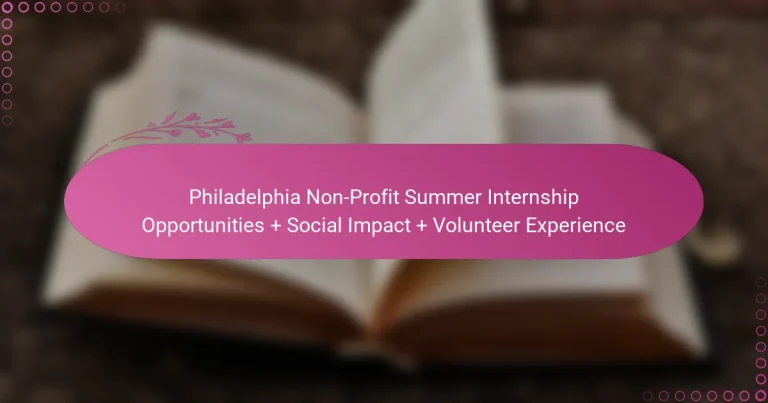

What are the common mistakes to avoid in Philadelphia summer internship applications?
Common mistakes to avoid in Philadelphia summer internship applications include submitting generic resumes and cover letters. Tailoring application materials to each internship is crucial. Failing to research the company can lead to uninformed applications. Neglecting to follow application instructions often results in automatic disqualification. Additionally, overlooking deadlines can jeopardize an applicant’s chances. Not highlighting relevant skills and experiences is another frequent error. Lastly, poor proofreading can undermine professionalism, making errors in spelling or grammar noticeable.
Why is it important to recognize these mistakes?
Recognizing mistakes in internship applications is crucial for success. It allows applicants to improve their chances of securing a position. Identifying errors helps in presenting a polished and professional image. Mistakes can lead to negative impressions from potential employers. Research indicates that 76% of hiring managers reject candidates due to application errors. By acknowledging these mistakes, applicants can enhance their skills and refine their approach. This ultimately leads to more successful outcomes in their internship search.
How can avoiding these mistakes improve your chances of success?
Avoiding common mistakes in Philadelphia summer internship applications can significantly enhance your chances of success. By not submitting generic resumes, candidates can tailor their applications to specific roles. This customization demonstrates genuine interest and aligns skills with job requirements. Furthermore, avoiding typos and grammatical errors presents a professional image. A polished application reflects attention to detail, a quality valued by employers. Additionally, steering clear of vague language helps candidates articulate their achievements clearly. Clear communication of past experiences can make a strong impression. Lastly, not missing application deadlines ensures candidates remain in contention. Timeliness is often critical in competitive internship environments.
What are the potential consequences of making these mistakes?
Making mistakes in Philadelphia summer internship applications can lead to disqualification. Applicants may miss out on valuable opportunities. Poorly written resumes can result in negative impressions. Failing to follow application instructions can lead to automatic rejection. Not tailoring applications to specific internships can diminish relevance. Ignoring deadlines can cause missed chances for interviews. Lack of professionalism in communication can harm applicant credibility. These consequences can significantly reduce the likelihood of securing an internship.
What are the most frequent errors applicants make?
The most frequent errors applicants make include submitting generic resumes. Many applicants fail to tailor their resumes to specific internship positions. This lack of customization can lead to missed opportunities. Another common error is neglecting to follow application instructions. Applicants often overlook details such as required documents or specific formats. Poor grammar and spelling mistakes are also prevalent in applications. These errors can create a negative impression on hiring managers. Additionally, applicants frequently underestimate the importance of networking. Failing to connect with professionals in the field can limit their chances of success. Lastly, many applicants do not prepare adequately for interviews. This lack of preparation can result in poor performance during the interview process.
How does a lack of research impact your application?
A lack of research negatively impacts your application by reducing its relevance and effectiveness. When applicants do not research the internship, they fail to align their skills with the organization’s needs. This misalignment can lead to generic applications that do not stand out. Furthermore, applicants may miss critical information about the company culture and values. Without this knowledge, they may inadvertently communicate a lack of interest or fit. Research can also provide insights into industry trends that enhance the applicant’s credibility. Statistics show that tailored applications significantly increase interview rates. For instance, a study by Jobvite found that personalized applications can improve response rates by up to 50%.
What role does tailoring your resume play in avoiding mistakes?
Tailoring your resume plays a crucial role in avoiding mistakes during internship applications. A customized resume aligns your skills and experiences with specific job requirements. This alignment helps prevent generic statements that may not resonate with employers. It also reduces the risk of including irrelevant information that could detract from your qualifications. Research shows that tailored resumes increase interview chances by up to 40%. By addressing the specific needs of the internship, you demonstrate attention to detail and genuine interest. This approach minimizes the likelihood of misrepresenting your qualifications or experiences. Ultimately, tailoring your resume enhances clarity and relevance, making your application more compelling.
How can poor communication skills lead to application errors?
Poor communication skills can lead to application errors by causing misunderstandings of requirements. Interns may misinterpret job descriptions or application guidelines. This misunderstanding can result in incomplete applications or missing documents. Additionally, unclear communication can lead to errors in personal information, such as incorrect contact details. Miscommunication during interviews can also affect the perception of an applicant’s qualifications. According to a study by the National Association of Colleges and Employers, 73% of employers value communication skills highly. Thus, poor communication can significantly diminish an applicant’s chances of success.

How can you effectively prepare your application to avoid mistakes?
To effectively prepare your application and avoid mistakes, start by thoroughly reviewing the application guidelines. Ensure you understand the requirements and deadlines. Next, tailor your resume and cover letter to the specific internship. Highlight relevant skills and experiences that match the job description. Proofread all documents for grammatical errors and clarity. Use tools like Grammarly or ask a peer to review your application. Additionally, gather all required documents early, such as transcripts and recommendation letters. This proactive approach minimizes last-minute issues. Lastly, practice common interview questions to enhance your confidence.
What steps should you take before submitting your application?
Review your application for completeness. Ensure all required documents are included. Check for errors in spelling and grammar. Confirm that your resume is updated with relevant experiences. Tailor your cover letter to the specific internship. Research the organization to align your application with their values. Seek feedback from mentors or peers on your application. Finally, verify submission deadlines and requirements to avoid last-minute issues.
How important is it to proofread your application materials?
Proofreading your application materials is crucial. It ensures clarity and professionalism. Errors can lead to miscommunication and create a negative impression. A survey by the National Association of Colleges and Employers found that 70% of employers consider attention to detail essential. Typos or grammatical mistakes can undermine your qualifications. Therefore, thorough proofreading can significantly enhance your chances of success.
What resources can help you avoid common pitfalls?
Career services at universities provide guidance on internship applications. They offer workshops and one-on-one consultations. These resources help students understand common mistakes. Online platforms like LinkedIn Learning provide courses on resume building and interview techniques. Additionally, industry-specific forums and groups can offer insights into best practices. Peer reviews of application materials can also highlight potential pitfalls. Utilizing these resources increases the chances of a successful internship application.
What should you consider when seeking feedback on your application?
When seeking feedback on your application, consider the source of the feedback. Choose individuals with relevant experience in your field. Their insights will be more valuable. Additionally, be open to constructive criticism. This can help you identify areas for improvement. Ensure you ask specific questions about your application. This directs feedback to particular aspects you want to enhance. Lastly, consider the timing of your request. Seeking feedback early can allow for revisions before submission.
Who can provide valuable insights into your application quality?
Hiring managers can provide valuable insights into your application quality. They assess applications and understand what stands out. Their feedback can highlight strengths and weaknesses in your submission. Additionally, mentors or career advisors can offer guidance based on industry standards. They can help refine your application and improve its effectiveness. Peer reviews from fellow applicants may also yield constructive criticism. Engaging with these individuals enhances your understanding of application quality.
How can peer reviews help identify mistakes you might overlook?
Peer reviews can help identify mistakes you might overlook by providing an external perspective on your work. Colleagues may notice errors or inconsistencies that you have missed due to familiarity with the content. They can offer constructive feedback that highlights areas for improvement. This process can enhance the clarity and effectiveness of your application. Research shows that peer feedback can significantly increase the quality of written work. A study published in the Journal of Educational Psychology found that peer reviews improve critical thinking and writing skills. Engaging others in the review process can lead to a more polished final submission.

What are the best practices for a successful Philadelphia summer internship application?
Tailor your resume and cover letter to each position. Highlight relevant skills and experiences. Research the organization thoroughly before applying. Understand its mission and values. Network with professionals in your field. Attend career fairs and informational interviews. Follow application instructions precisely. Submit all required documents on time. Prepare for interviews by practicing common questions. Demonstrating enthusiasm for the role increases your chances.
How can you make your application stand out positively?
To make your application stand out positively, focus on tailoring your resume and cover letter to the specific internship. Highlight relevant skills and experiences that align with the internship requirements. Use clear and concise language to showcase your achievements. Incorporate quantifiable results to demonstrate your impact in previous roles. Research the company and mention specific projects or values that resonate with you. This shows genuine interest and initiative. Additionally, seek recommendations from previous employers or professors to add credibility. According to a survey by the National Association of Colleges and Employers, 70% of employers prefer candidates with tailored applications.
What specific qualities should you highlight in your application?
Highlight relevant skills, experiences, and personal attributes in your application. Emphasize your ability to work in teams, adapt to new environments, and communicate effectively. Showcase your problem-solving skills and initiative. Mention any leadership roles or volunteer work that demonstrate commitment and reliability. Include specific examples of past achievements to illustrate your qualities. Tailor these attributes to the internship’s requirements for maximum impact.
How does networking influence your application success?
Networking significantly influences application success by providing access to opportunities and insider information. Connections can offer referrals that enhance credibility. According to a survey by Jobvite, 70% of jobs are found through networking. This highlights the importance of personal relationships in the hiring process. Networking also allows candidates to learn about company culture and expectations. Engaging with professionals can lead to valuable mentorship and guidance. Therefore, cultivating a strong network is essential for improving application outcomes.
What final tips can help you ensure a polished application?
Thoroughly review your application for errors and clarity. Check for spelling and grammatical mistakes, as they can undermine your professionalism. Ensure that your formatting is consistent and visually appealing. Tailor your application to the specific internship, highlighting relevant skills and experiences. Seek feedback from peers or mentors to gain fresh perspectives. Use clear and concise language to convey your message effectively. Confirm that your contact information is accurate and up-to-date. Finally, submit your application ahead of the deadline to avoid last-minute issues.
How can you create a checklist for your application process?
To create a checklist for your application process, identify key steps involved in the application. Start by listing all required documents, such as resumes and cover letters. Next, include deadlines for each application submission. Verify that you have tailored each application to the specific internship. Ensure you have contacted references and requested letters of recommendation. Review each application for spelling and grammatical errors. Finally, track your submissions and follow up with employers after applying. This structured approach helps in staying organized and avoiding common application mistakes.
What are the top three things to double-check before submission?
Verify the application format. Ensure it adheres to the specified guidelines. Check for document type, layout, and required sections. Confirm all requested materials are included.
Review spelling and grammar. Errors can undermine professionalism. Utilize tools like spell check and grammar check. Proofreading helps catch overlooked mistakes.
Examine deadlines and submission methods. Ensure the application is submitted on time. Confirm the correct platform or email address is used for submission.
The main entity of this article is “Philadelphia summer internship applications.” The article outlines common mistakes applicants make, such as submitting generic resumes, failing to tailor application materials, neglecting to research companies, and overlooking deadlines. It emphasizes the importance of recognizing these errors to enhance the chances of securing an internship. Additionally, the article provides strategies for avoiding these pitfalls, including effective preparation, seeking feedback, and utilizing resources like career services. By addressing these aspects, candidates can improve their application quality and overall success in the competitive internship landscape.





